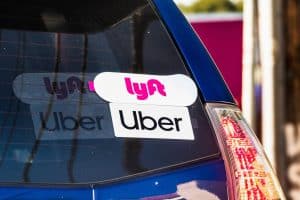How Safe Are Lyft and Uber Rides?
 Residents of North Dakota scheduling rides through Lyft and Uber expect safe, convenient transportation. Most of these rides end with the driver safely delivering the passenger to the requested destination, but Uber’s Second U.S. Safety report on “critical safety incidents” released in June 2022 again shows hundreds of passengers died in fatal traffic accidents and assaults during trips in the period 2019-2020, while thousands of others suffered sexual assault. Lyft’s “Community Safety Report,” which covered 2017-2022, showed fewer fatal accidents and assaults, but higher numbers of sexual assaults and rapes.
Residents of North Dakota scheduling rides through Lyft and Uber expect safe, convenient transportation. Most of these rides end with the driver safely delivering the passenger to the requested destination, but Uber’s Second U.S. Safety report on “critical safety incidents” released in June 2022 again shows hundreds of passengers died in fatal traffic accidents and assaults during trips in the period 2019-2020, while thousands of others suffered sexual assault. Lyft’s “Community Safety Report,” which covered 2017-2022, showed fewer fatal accidents and assaults, but higher numbers of sexual assaults and rapes.
Two weeks after publication of the Safety Report, TechCrunch reported that 550 victims of sexual assault from around the country had filed lawsuits against Uber, claiming the company did not warn or protect riders of risks from drivers. These events raise the question: How safe are Uber and Lyft rides?
What do Uber’s safety reports reveal about fatalities and sexual assaults during rides?
Uber’s U.S. Safety Report page states that the company “embed[s] safety into everything we do. We’re committed to continually improving the safety of our platform for all who use it.” The reports cover three categories of “critical safety incidents”:
- Traffic fatalities
- Fatal physical assaults
- Sexual assaults, including
- nonconsensual kissing of a nonsexual body part
- attempted nonconsensual sexual penetration
- nonconsensual touching of a sexual body part
- nonconsensual kissing of a sexual body part
- nonconsensual sexual penetration
The reports do not cover numbers of non-fatal traffic accidents resulting in passenger injury, or any other types of personal injury suffered by passengers during Uber trips. Both reports also state that 99.9% of U.S. Uber trips end without any safety incidents.
USA Today summarized the numbers of traffic fatalities, fatal physical assaults, and sexual assaults listed in the Second Safety Report:
- 101 people died in 91 Uber traffic accidents in 2019-2020.
- 20 people died by assault in 2019-2020.
- The First Safety Report included similar numbers for these categories of deaths.
- 3,824 people were sexually assaulted, “across the five most severe categories of sexual assault and misconduct.”
By comparison, the First Safety Report reported 5,981 allegations of physical sexual assault.
CNN further reported 141 people were raped. The Second Safety Report covered fewer trips than the First Safety report due to a decrease in 2020 ridership due to the pandemic, with Uber recording 650 million trips in 2020, but 1.4 billion in 2019.
How dangerous is it to take a Lyft?
According to Lyft’s Community Safety Report, “from 2017 to 2019, over 99% of trips occurred without any reported safety incident. The safety incidents referenced in this report account for 0.0002% of all trips.” In 2019 (the most recent year available) there were a total of 49 fatal accidents involving Lyft, and four reports of fatal physical assault.
By comparison, there were significantly more reports of sexual misconduct. Over the three-year period, there were 4,158 reports of sexual assault of misconduct, which included 260 reports of rape. Lyft has long had an issue with sexual assault; it is was spurred the company to partner with the Rape, Abuse & Incest National Network (RAINN) back in 2019.
What other risks of injury do passengers encounter during Lyft and Uber rides?
Rideshare passengers also face the same types of risks and potential for injuries from various types of car accidents as passengers in other vehicles on the road, and can be injured or killed in crashes caused by dangerous driving behaviors, such as:
- Distracted or fatigued driving
- Drunk or drugged driving
- Reckless driving
- Speeding
- Hit-and-run accidents
- Rear-end crashes
Injured passengers may require medical care for injuries, lose wages, and incur pain and suffering.
Who is liable if I am injured or sexually assaulted by a Lyft driver?
Who is liable for your injuries will depend on your situation. Since Lyft treats its drivers as independent contractors, rather than employees, drivers are also responsible for carrying appropriate insurance. Both Uber and Lyft have the following contingent insurance policies in place:
- If the driver is not logged into the app, Lyft covers nothing.
- If the drivers is logged in, but has not yet accepted a ride, Lyft covers up to $50,000/$100,000 for bodily injury and up to $25,000 in property damage.
- If the driver is logged in and has accepted a ride, Lyft covers up to $1 million total in bodily injury and property damage.
Depending on the circumstances, liability in these accident and assault situations may extend to:
- The driver of the rideshare vehicle
- The rideshare company
- The insurance company
- The driver of the other vehicle, in cases of two-vehicle collisions
As such, if you are sexually assaulted or injured in a crash by a Lyft driver who is “off the clock,” then the driver himself or herself may be fully liable.
What about criminal charges?
Criminal charges may be filed against rideshare drivers committing crimes against passengers. However, injured passengers may also file their own civil suits for damages. When assaults or sexual assaults and rapes occur during a rideshare, rideshare companies also may be held liable for the rider’s injuries if they fail to provide reasonable safety measures for passengers, such as performing appropriate driver background checks and investigating driver sexual misconduct against passengers.
Contact our attorneys today
If you or a family member has been injured, killed, or assaulted during an Uber or Lyft trip, you will need an experienced rideshare attorney to represent your interests. Larson Law has experienced car accident and personal injury attorneys familiar with Uber and Lyft who can investigate responsibility for the injuries. We have offices in Minot, Bismarck, and Fargo. Contact us to schedule a free consultation or call us today at 701-484-HURT.

Mark Larson is a Certified Civil Trial Specialist and Certified Civil Pre-Trial Specialist focusing on personal injury, car accidents, wrongful death, and oil field claims. Since 1979, Larson Law has served the injured throughout North Dakota. Read more about Mark V. Larson.
